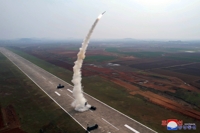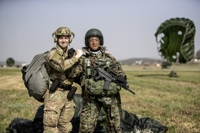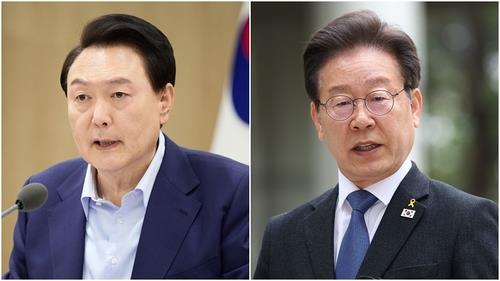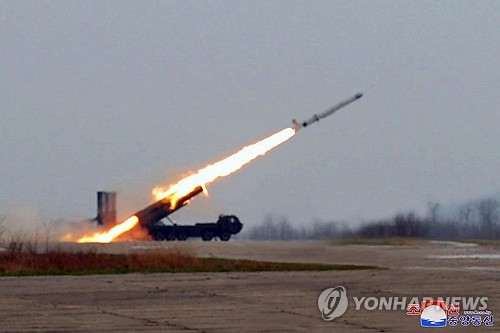USFK commander: Kim Jong-un's goal is to break unity among regional powers
By Lee Chi-dong
SEOUL, July 27 (Yonhap) -- North Korean leader Kim Jong-un is attempting to deter unity between South Korea, the U.S., China, Russia and Japan with a string of belligerent acts, the top American military commander here said Thursday.
Gen. Vincent K. Brooks, who commands U.S. Forces Korea (USFK), pointed out that the communist regime's nearly weekly missile tests have become "the new normal."
The North test-fired 28 ballistic missiles in 2016 alone, followed by 10 others this year, including what is believed to be an intercontinental ballistic missile (ICBM).
It's also reportedly preparing for another missile launch in the coming days, although there was no report of a launch on Thursday, the 64th anniversary of the Korean War Armistice Agreement.
"His actions intend to sow friction and fissures among the five in order to prevent them from coming together as a cohesive block," Brooks said, addressing a forum under way in Nebraska, a U.S. state, according to the USFK's website.
The two-day symposium on deterrence is being hosted by the U.S. Strategic Command.
"He's trying to prevent the creation of a closed fist against him," the commander said, showing the five fingers of his hand to refer to the five countries involved in the now-suspended denuclearization talks with Pyongyang.
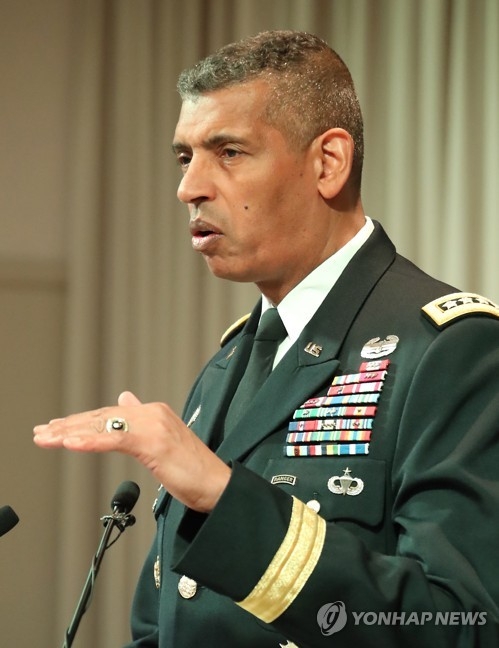
Gen. Vincent K. Brooks, who commands U.S. Forces Korea (USFK), delivers a speech in Seoul in this file photo. (Yonhap)
He described the North Korea issue as a "wicked problem" and called for a "creative" approach to resolve it by pooling the wisdom of various people.
He also stressed the importance of deterrence for the part of the U.S. and its allies.
"Deterrence aims to cause adversaries to reconsider their resolve to accept whatever consequences might emerge from their actions and to choose something less than having an adversary try to break their will -- in other words, bringing an adversary to his senses," he said.
Compellence, however, must remain an option if North Korea does not choose to be deterred instead, he added.
He appreciated South Korea's efforts to improve its own defense power including the purchase of F-35 stealth jets, AH-64 Apache helicopters, more Aegis-equipped warships and the upgrade to Patriot missiles, coupled with the decision to deploy the THAAD missile shield.
South Korea has increased its defense budget to over US$34 billion in 2017, 2.6 percent of its gross domestic product. The Moon Jae-in administration stated that it would raise the ratio to 2.9 percent within the next five years.
"These capabilities invested in by the Republic of Korea will add to the ongoing efforts to reduce North Korea's ability to hold the Republic of Korea (South Korea) and the U.S. forces present at risk," said Brooks.
He is wearing two other hats -- the head of the United Nations Command (UNC) and the allies' Combined Forces Command.
The UNC has preserved the armistice that ended the 1950-53 conflict, he noted, as the command held a ceremony to mark the armistice anniversary at the truce village of Panmunjom on Thursday.
lcd@yna.co.kr
(END)
-
 Overdue debut of Korean abstract art pioneer Yoo Young-kuk at Venice Biennale
Overdue debut of Korean abstract art pioneer Yoo Young-kuk at Venice Biennale -
 Defense chief says N. Korea's hypersonic missile 'unsuccessful' in last-stage glide flight
Defense chief says N. Korea's hypersonic missile 'unsuccessful' in last-stage glide flight -
 Relax, immerse yourself in scents at Venice Biennale's Korean Pavilion
Relax, immerse yourself in scents at Venice Biennale's Korean Pavilion -
 N. Korea has capability to genetically engineer biological military products: U.S. report
N. Korea has capability to genetically engineer biological military products: U.S. report -
 S. Korea marks 30th anniv. of Korean Pavilion at Venice Biennale with contemporary art
S. Korea marks 30th anniv. of Korean Pavilion at Venice Biennale with contemporary art
-
 Overdue debut of Korean abstract art pioneer Yoo Young-kuk at Venice Biennale
Overdue debut of Korean abstract art pioneer Yoo Young-kuk at Venice Biennale -
 Relax, immerse yourself in scents at Venice Biennale's Korean Pavilion
Relax, immerse yourself in scents at Venice Biennale's Korean Pavilion -
 Artist Lee Bae captures ethereal Korean aesthetics at Venice Biennale
Artist Lee Bae captures ethereal Korean aesthetics at Venice Biennale -
 S. Korea marks 30th anniv. of Korean Pavilion at Venice Biennale with contemporary art
S. Korea marks 30th anniv. of Korean Pavilion at Venice Biennale with contemporary art -
 Defense chief says N. Korea's hypersonic missile 'unsuccessful' in last-stage glide flight
Defense chief says N. Korea's hypersonic missile 'unsuccessful' in last-stage glide flight
-
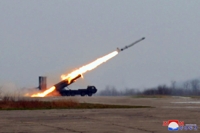 (2nd LD) N. Korea says it conducted 'super-large warhead' test for strategic cruise missile
(2nd LD) N. Korea says it conducted 'super-large warhead' test for strategic cruise missile -
 N. Korea says it conducted 'super-large warhead' test for strategic cruise missile
N. Korea says it conducted 'super-large warhead' test for strategic cruise missile -
(URGENT) N. Korea conducted 'super-large warhead' test for strategic cruise missile: KCNA
-
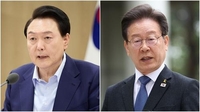 (LEAD) Yoon proposes first-ever meeting with opposition leader
(LEAD) Yoon proposes first-ever meeting with opposition leader -
 (LEAD) Gov't accepts university chiefs' request on med school enrollment quota: PM
(LEAD) Gov't accepts university chiefs' request on med school enrollment quota: PM















